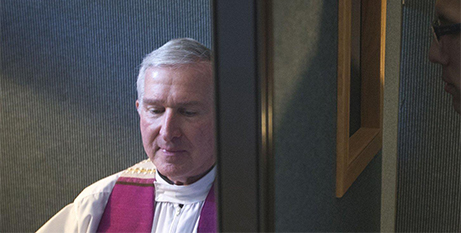The other day on social media a Catholic grumbled about his experience at confession. The priest launched into a long lecture which was a mixture of personal advice, psychobabble and pop theology. The penitent was impatient at this and resented having to sit and listen to father’s ruminations.
I sympathize and certainly in my years as both a Catholic layman and priest my experiences as a penitent have been somewhat mixed. I remember a liberal priest who tried to convince me that the sins I had confessed weren’t really sins at all. They were. Another priest not only neglected to grant me absolution, saying “Go in peace and remember Jesus loves you.” but almost refused to say the words of absolution when I specifically asked him to. I came away quite angry and frustrated, thinking, “Geesh, how hard can it be to just say the formula?” This same priest had already subjected me to a fifteen minute amateur psychology lecture about my confession. I accepted that as my penance.
However, there is another side to the story. While penitents have to listen to long winded or misguided priests from time to time–remember what priests have to listen to. We sit there for hours at a time listening to mostly venial sins, trying to be patient with people with scruples, suffering from those poor souls who come to confession because (it seems) doing so makes them feel better about themselves. Now don’t start throwing stones at me. I’m just voicing the other side of the story.
Fact is, confession can be a dull and wearisome duty for both priests and people. We should all be reminded that sin is ultimately boring. It’s a dead thing. It is dead because there is nothing original about sin. Sin is always a distortion or a destruction of something beautiful, good and true. Yes it is soul destroying, but there is a dull, dead, emptiness that makes the sacrament of confession a dull duty for us all. The good thing, of course, is that the other end of the tunnel is light. Beautiful, clear morning light of forgiveness and reconciliation.
So, with all this in mind, what is the proper relationship between confession and counseling? The priest should know enough psychology to know that he is not a professional counselor and to be able to help the penitent discern whether he or she should consult a professional counselor. The priest should also know some good Catholic counselors to recommend. More often, if a problem arises that requires extra pastoral care the priest should simply suggest that the penitent make an appointment to discuss the matter further with the priest outside the sacrament of confession. This enables the pastor to explore the problem in more depth with the penitent without this relationship and conversation intruding on the sacrament. This approach takes the confession and penitent seriously without turning the confessional into an imposed counseling session.
For the penitent’s part–as one priest friend says to the folks in the confession line, “Tell me your sins, not a story” In other words, if you want to keep it short and sweet that’s ok. There are probably other people in line. Prepare beforehand with a good examination of conscience. Be clear about your sins and the number of times. Don’t pussy foot around with pious or vague circumlocutions that lessen the sin. You didn’t “lose custody of your eyes” you looked at porn. You didn’t “do something inappropriate with your boyfriend”. You committed fornication. On the other hand, no need to go into explicit detail.
Remember that the gravity (or not) of the sin is not determined by how guilty or ashamed you feel. A sin of the flesh that you are terribly embarrassed, guilty and ashamed of may be little more than a simple human weakness of the flesh whereas a deliberate act or word of cruelty about which you do not feel at all guilty may be much more serious because it hurts another person on purpose in a pre meditated way. Assess the gravity of the sin objectively with an aid and a well formed conscience.
Also remember, you don’t have to go to confession for every venial sin. Venial sins are covered by Christ’s forgiveness through a sincere act of Contrition and/or the Confiteor at the beginning of Mass.
As to mortal sin–there is a difference between being in a “state of mortal sin” and committing a mortal sin. Committing a mortal sin and being instantly repentant lifts the condition of it being a mortal sin if the person also intends to go to confession as soon as they can. Being in a “state of mortal sin” is when a person not only commits a mortal sin, but remains in that sin justifying it and continuing in it. A married man who continues to be unfaithful with a mistress is in a state of mortal sin. A man who commits adultery and then repents and rejects the sin is not.
Finally, remember God’s mercy is everlasting. The Church is there to express and administer that mercy. Whichever side of the screen you are on–that’s what its all about.







Leave A Comment
You must be logged in to post a comment.